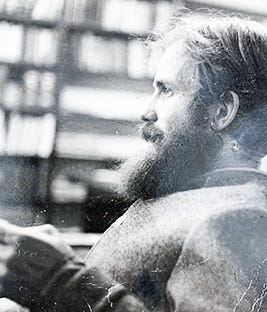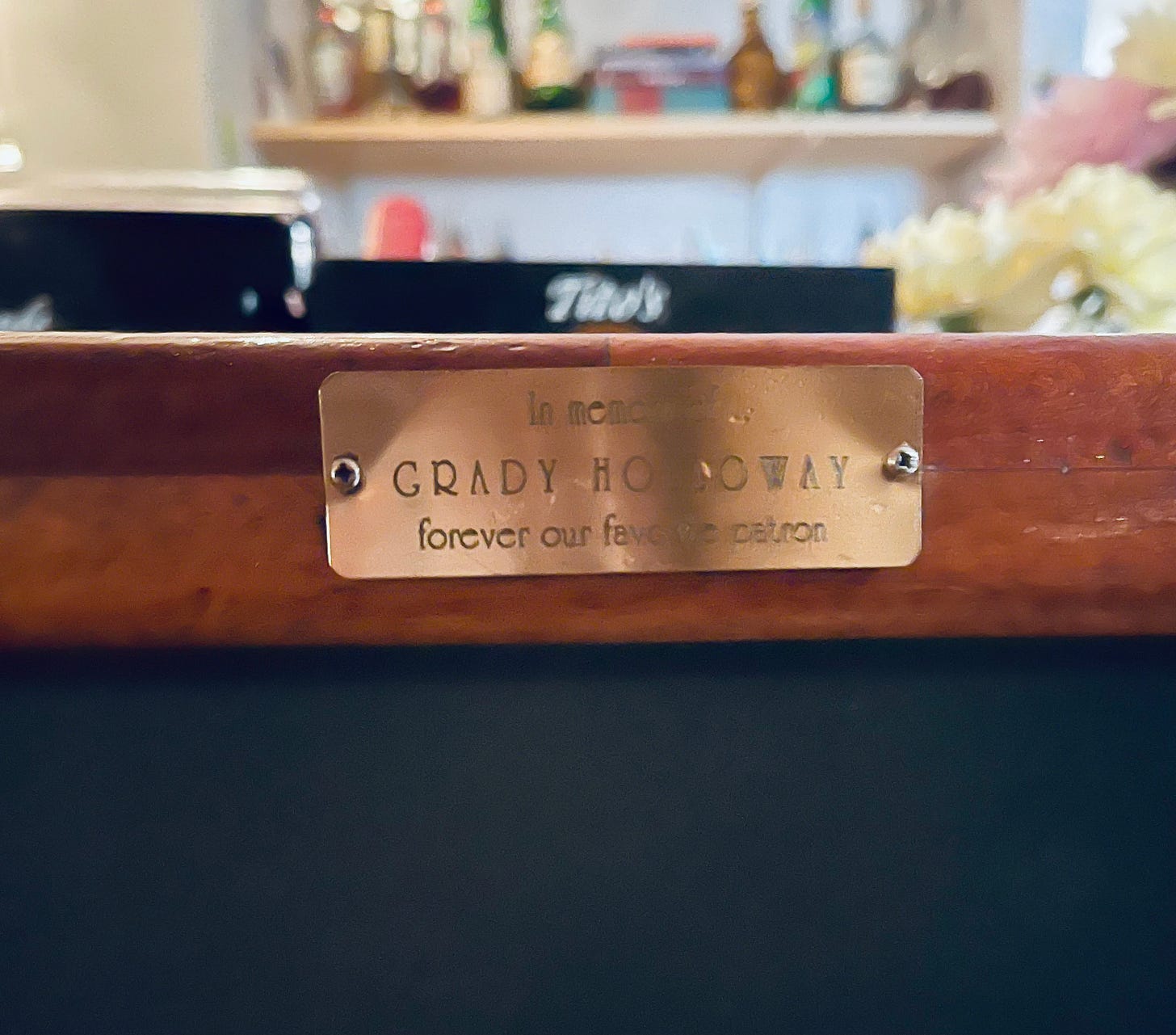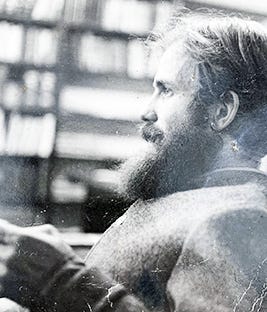Grady Holloway
Living Happy Extra
Last night Shaun and I went out to dinner and on our meandering way home, we walked by the Lompoc Café, which back when I first came to Mount Desert Island and Bar Harbor was this place I fell in love with. There was a little patio outside and an enormous, gorgeous tree in the middle of it. They had vegetarian food. Back then, it was harder to find vegetarian food. You’d have to hunt it out and hope for something that wasn’t just spaghetti in marinara sauce.
When we left Bar Harbor after my-then-husband, my-then-undergraduate-husband (scandalous, I know!) presented at a conference at Jackson Laboratory, my heart hurt because I was positive we were supposed to stay. I have a couple vivid memories of that weekend. Our baby, Em, learning how to clap while standing outside of the Atlantic Eyrie, butterflies everywhere, and the Lompoc.
So, the Lompoc has always represented something to me, but as the years have gone by, I didn’t go inside much. I’d occasionally have dinner with Em on the patio. She always gets mussels. And a couple of weeks ago, our friends were there and I was finally brave enough to go inside.
‘The Banks o’ Doon’. Ye banks and braes o’ bonie Doon, How can ye bloom sae fresh and fair? How can ye chant, ye little birds, And I sae weary fu’ o’ care! Thou’ll break my heart, thou warbling bird, That wantons thro’ the flowering thorn: Thou minds me o’ departed joys, Departed never to return …
Last night, I was brave again. It was early in the evening. There weren’t a ton of people by the bar. The bar was a place that my friend Grady Holloway sat almost every day he lived here. He’d go through phases of what he’d order: half a shot of tequila, half a glass of Sam Adams, whiskey, or sometimes just ginger ale.
There is little name plate by a seat of the bar with his name on it. My friend had sent me a photo of it a couple weeks ago, but when we went that time, meeting them, it had been too crowded to see it ourselves.
“Should we go in?” I asked Shaun. “Should we go see?”
“Of course.”
Shaun is not a man who waffles. Shaun is a man of “of course.”
We went inside and I told the co-owner who was behind the bar that we were here to see Grady’s plaque. Or maybe Shaun did. I sort of blank on this part of the night because it just felt so big, so real, so unequivocable.
Grady’s name is on a bar.
Grady is not here anymore.
To put this in context, Grady has been dead for three years. To put this in context, I haven’t quite reconciled myself to that fact because Grady seemed immortal to me: a bearded Zeus sitting behind a large metal news desk, Red Sox hat perched on his head, eyes peering wisely out on all us young reporters, running around without a clue. No. Merlin. Em always said he was like Merlin, a wizened wizard of kindness. She’d climb on his metal desk, take his beard in her tiny hands and tug, giggling.
“Do you think it’s not real? Tug,” he’d say. “Find the proof, you little ragamuffin.”
Then they’d laugh. The arts editor would shake her head and roll her eyes and bemoan her own lack of a beard for Em to pull.
Grady, himself, was never good at death. When we went to a funeral together, back when he was one of my bosses at our local newspaper, the Ellsworth American, he said, “CiCi, can you please go with me.”
Grady called me CiCi. Then, almost everyone did. It is hard to resist Grady’s pull, his influence. He spoke with a low, rumbling voice. It was the voice of a cowboy, honestly, and betrayed his Oklahoma roots.
“I don’t like funerals, Grady,” I told him, “but I’m good at then.”
“We’ll stand next to each other and hold each other up,” he decided.
And that’s what we did. We somehow became almost a part of the receiving line. Every so often Grady would lean in, and I’d hold him up. Every so often, I’d do the same.
When I broke my finger at the Ellsworth playground in a ridiculous way (imagine the top part at a 90-degree angle) and Em (first grader now) was there, and I didn’t want her to have to stay in the ER with me for hours, Grady came, rushing to the rescue, swooping in like a cowboy grandpa and snatching her away for adventures with him and his then-wife Tacy.
She told me that they were her favorite humans in the whole world after me, her dad, and my mom. To be fair, I think they surpassed her dad and me
When Em’s dad and I both failed miserably at trying to assemble her swing set when we moved, Grady swooped in again, painstakingly putting it together piece by piece.
“Wow,” I said.
Another co-worker said, “Carrie. Grady built a house in Sedgwick all by himself.”
“He did?
“He did. Grady can do anything.”
I always believed that. This was a man that could tame horses and angry newspaper readers. He could wax poetic about all noir and spy novels, whiskey and beer, poets and all things Scottish and all things Red Sox. He could quietly squire in a group of listeners as he talked about his time as a Colorado taxi driver, days with beat poets, Rolling Stone reporters, and E. B. White.
When I was on my honeymoon in Scotland, a disaster of epic proportions, I roamed the streets of Glasgow alone at night, calling Grady.
“Do you need me to come and get you?” he asked.
“Maybe.”
“You need to get out of there now?”
“Scotland?”
“No. Your marraige. Scotland? You should stay.”
He knew what a subordinate clause was and when to use it.
He knew how to tell all reporters what a subordinated clause was and how to punctuate it.

Grady savored a mystery in a book or in a person. He would get tired of people sometimes when he figured them out or if they were too superficial in their interactions. He didn’t want superficiality. He wanted depth, mystery, nuance, complication, the twist that made you gasp with epiphanies.
Grady wanted the inside of a poem, the truth beneath the words, the whispers in the white spaces around the print.
He was proud, so proud, of his sons: Eachan, Will, and Ben. The few times he talked about Ben, who died back in 1985, he would tear up a bit. Grady wasn’t a person who teared up much. But he did when it mattered.
We’d meet at Morning Glory or the Dog and Pony a decade later when we were both in Bar Harbor instead of Ellsworth, Maine. He’d expound on the noir novels he was reading and the short stories he was writing. He’d know all the town gossip and every detail of the New York Times. He’d advise me on men: who was good enough, who wasn’t. He’d tell me about sitting in the Lompoc and how much he loved the Kelly sisters. He’d tell me about his sons. He told me he sometimes imagined that I was his long-lost daughter.
“Your mom looks a little familiar,” he’d tease.
I was positive that Grady was my best friend, but that’s something a lot of people were positive about.
Last night, at the Lompoc, as I stared at his name, touched the letters etched into the plaque, the co-owner told me stories of Grady. Then another young woman came over. She’d been Grady’s neighbor in his apartment building for about a year before he died and had seen us talking about the plaque.
They all seemed like Grady’s best friends.
“He made you feel like that,” one woman said. “He was good at that.”
But maybe that’s because Grady was the best at being a friend. He leaves a legacy of stories and intel and insight and also of random things, the ephemera of a person’s time here.
“There are bits of Grady in everyone’s apartment,” his neighbor told us. Books. Furniture. Maybe a typewriter. He ended up a bit of a hoarder, holding onto all things story: his own, other people’s, in written form, in potential written form (that typewriter love became a collection), but also stories that hadn’t been written down yet, stories that were only in voice or in brain. Books piled up and leaned onto typewriters. Newspapers and papers piled up and leaned against the legs of sofa.
Everything leaned, supporting each other. I think that’s how Grady saw his community though he, himself, was firmly Presbyterian in his desire to not lean, but to be useful, to find and make mysteries.
I loved Grady so much that I named a Red Sox-loving dragon after him in my Time Stoppers series. I loved Grady so much that just seeing his name makes me wonder about all those mysteries about him that I still don’t know. I loved Grady so much because he knew that sometimes you do have to lean.
Another piece where I mention Lompoc and Grady:







Beautiful! It made me wish to have known him, too.
I thought I had cried all my tears for today, until I read this. Such lovely words. Thank you for being an observer of the universe and conveying a feast of words for our hungry souls.